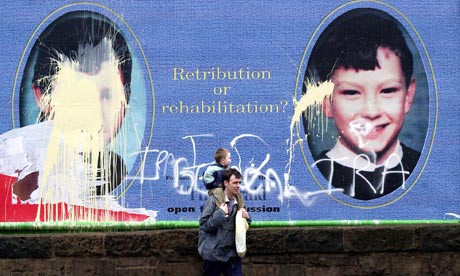- Joined
- Aug 29, 2008
- Messages
- 27,499
- Points
- 113
US child appeals against being tried for murder as an adult
Jordan Brown, who was 11 when he allegedly killed his father's pregnant fiancee, could face life sentence with no parole

Lawyers for a child in Pennsylvania who was 11 when he allegedly shot and killed his father's pregnant fiancee attempted today to persuade an appeals court not to try him as an adult under America's harsh system of juvenile justice.
Unless the lawyers for Jordan Brown who is now aged 13, can convince the judges to change tack, he will be tried in adult court and if convicted will serve an automatic life sentence with no chance of parole. He would become the youngest child in US history to be sentenced to be incarcerated forever.
The US is the only country where juveniles are serving life imprisonment without parole under the so-called "life means life" policy. Only the US and Somalia have refused to ratify the UN Convention on the Rights of the Child, which rules out life sentences with no chance of release for crimes committed before the age of 18.
Brown is accused of having killed Kenzie Houk, in February 2009 at her home in the countryside about 35 miles north-west of Pittsburgh. According to the prosecution, Brown shot her through the back of the head as she slept in her bedroom.
He is then alleged to have got on the school bus and gone to his elementary school as usual.
Houk, 26, was just two weeks away from her due date and her unborn child, who would have been called Christopher, died too. Brown has been charged with two counts of homicide.
Brown allegedly carried out the killing using his own hunting rifle, a shotgun designed specifically for children. The prosecution alleges that the killing was premeditated and they found residue from the gun on Brown's shoulder.
When he was first presented to court Brown was made to wear shackles around his wrists and ankles.
Human rights campaigners are protesting the treatment of Brown as an adult. Amnesty International said the move would be a violation of international law. "It is shocking that anyone this young could face life imprisonment without parole, let alone in a country which labels itself as a progressive force for human rights," said Susan Lee, head of the campaign's Americas operation.
The Sentencing Project, a Washington-based campaign, said no other country had juveniles serving life without parole. "That leads to only two conclusions: either kids in the US are far more violent than those in the rest of the world, or the US has developed uniquely harsh sentences."
At a federal level, the US penal system has been inching towards a more lenient approach to juvenile crime. In 2005 the US supreme court abolished the death penalty for under-18s.
Then last May it ruled that juveniles could not be subjected to life without parole for any crime other than homicide.
But that still leaves about 2,400 prisoners facing permanent imprisonment for homicides committed when they were children.
Pennsylvania, where all juveniles are automatically treated as adults unless a judge decides otherwise, heads the league table of 44 states that hand out the sentence, with about 450 cases.
Houk's death has divided the two families involved in their response to Brown's judicial treatment. The boy's father, Chris Brown, protests his son's innocence and says he has no idea what could await him.
"Try to explain to a 12-year-old what the rest of your life means. It's incomprehensible for him," he told ABC News last year.
The victim's mother, Deborah Houk, has pushed for the toughest sentence for the boy. "I can't stand this 'Oh, he's 11,' 'Oh, his clothes don't fit him,'" she told the Pittsburgh Tribune-Review soon after her daughter's death. "He knew what he was doing. He killed my baby."
Jordan Brown, who was 11 when he allegedly killed his father's pregnant fiancee, could face life sentence with no parole

Lawyers for a child in Pennsylvania who was 11 when he allegedly shot and killed his father's pregnant fiancee attempted today to persuade an appeals court not to try him as an adult under America's harsh system of juvenile justice.
Unless the lawyers for Jordan Brown who is now aged 13, can convince the judges to change tack, he will be tried in adult court and if convicted will serve an automatic life sentence with no chance of parole. He would become the youngest child in US history to be sentenced to be incarcerated forever.
The US is the only country where juveniles are serving life imprisonment without parole under the so-called "life means life" policy. Only the US and Somalia have refused to ratify the UN Convention on the Rights of the Child, which rules out life sentences with no chance of release for crimes committed before the age of 18.
Brown is accused of having killed Kenzie Houk, in February 2009 at her home in the countryside about 35 miles north-west of Pittsburgh. According to the prosecution, Brown shot her through the back of the head as she slept in her bedroom.
He is then alleged to have got on the school bus and gone to his elementary school as usual.
Houk, 26, was just two weeks away from her due date and her unborn child, who would have been called Christopher, died too. Brown has been charged with two counts of homicide.
Brown allegedly carried out the killing using his own hunting rifle, a shotgun designed specifically for children. The prosecution alleges that the killing was premeditated and they found residue from the gun on Brown's shoulder.
When he was first presented to court Brown was made to wear shackles around his wrists and ankles.
Human rights campaigners are protesting the treatment of Brown as an adult. Amnesty International said the move would be a violation of international law. "It is shocking that anyone this young could face life imprisonment without parole, let alone in a country which labels itself as a progressive force for human rights," said Susan Lee, head of the campaign's Americas operation.
The Sentencing Project, a Washington-based campaign, said no other country had juveniles serving life without parole. "That leads to only two conclusions: either kids in the US are far more violent than those in the rest of the world, or the US has developed uniquely harsh sentences."
At a federal level, the US penal system has been inching towards a more lenient approach to juvenile crime. In 2005 the US supreme court abolished the death penalty for under-18s.
Then last May it ruled that juveniles could not be subjected to life without parole for any crime other than homicide.
But that still leaves about 2,400 prisoners facing permanent imprisonment for homicides committed when they were children.
Pennsylvania, where all juveniles are automatically treated as adults unless a judge decides otherwise, heads the league table of 44 states that hand out the sentence, with about 450 cases.
Houk's death has divided the two families involved in their response to Brown's judicial treatment. The boy's father, Chris Brown, protests his son's innocence and says he has no idea what could await him.
"Try to explain to a 12-year-old what the rest of your life means. It's incomprehensible for him," he told ABC News last year.
The victim's mother, Deborah Houk, has pushed for the toughest sentence for the boy. "I can't stand this 'Oh, he's 11,' 'Oh, his clothes don't fit him,'" she told the Pittsburgh Tribune-Review soon after her daughter's death. "He knew what he was doing. He killed my baby."


